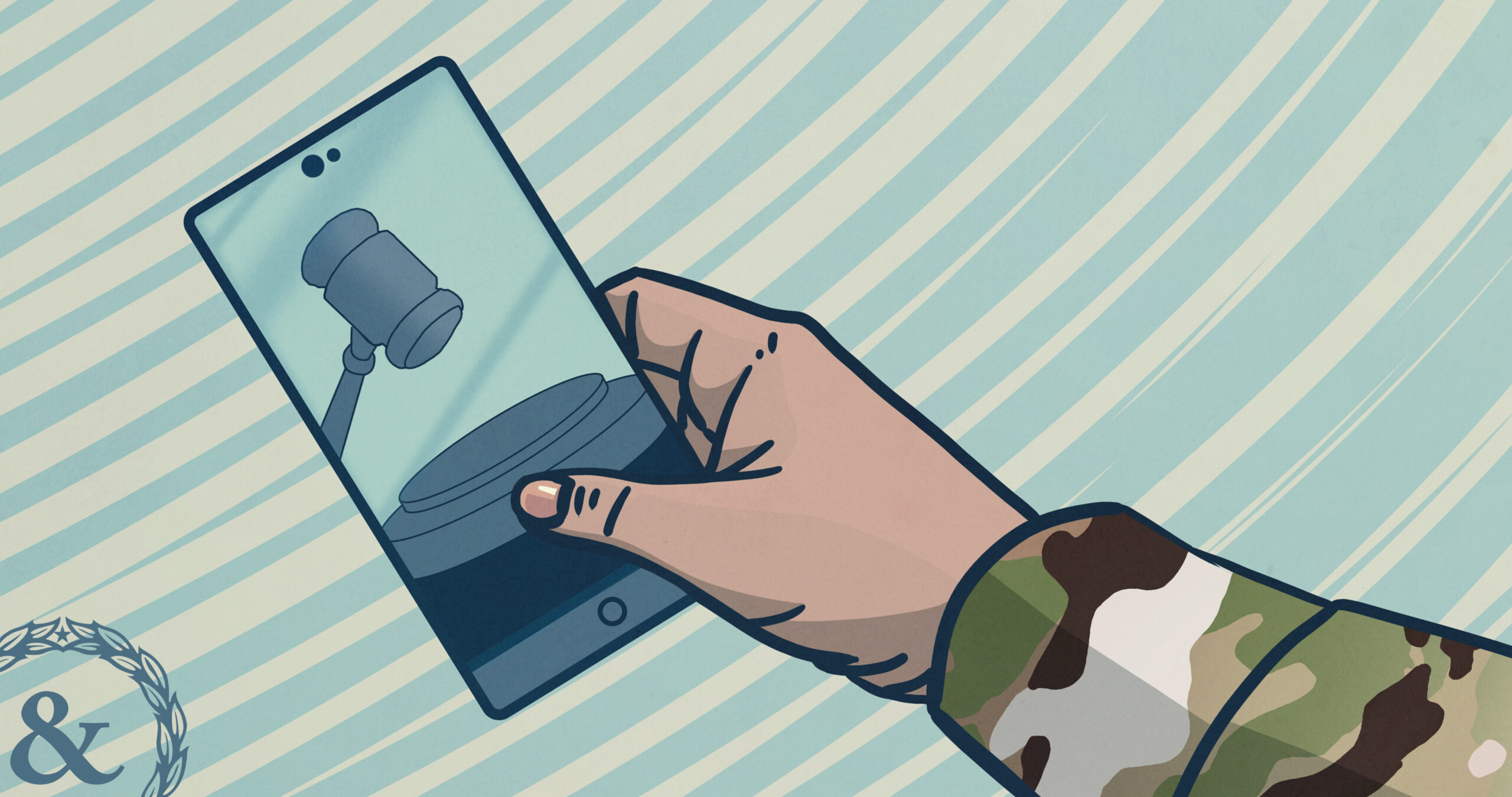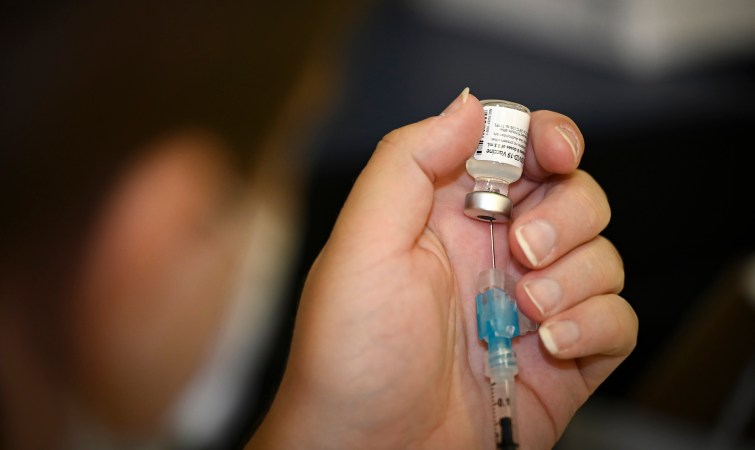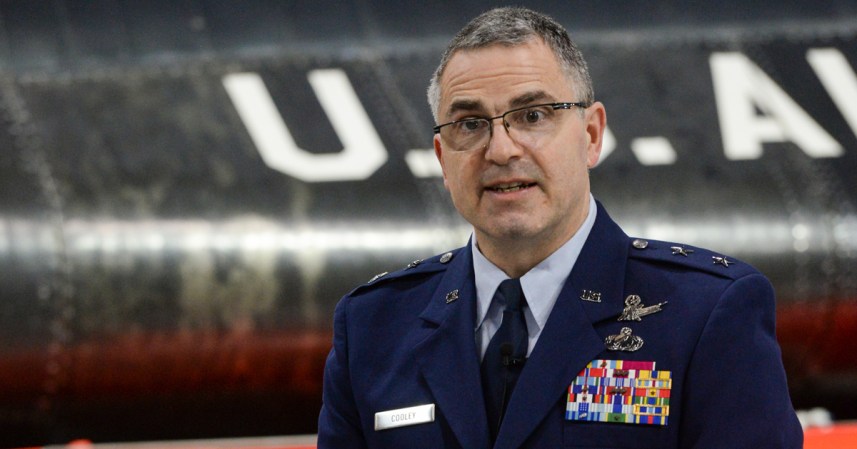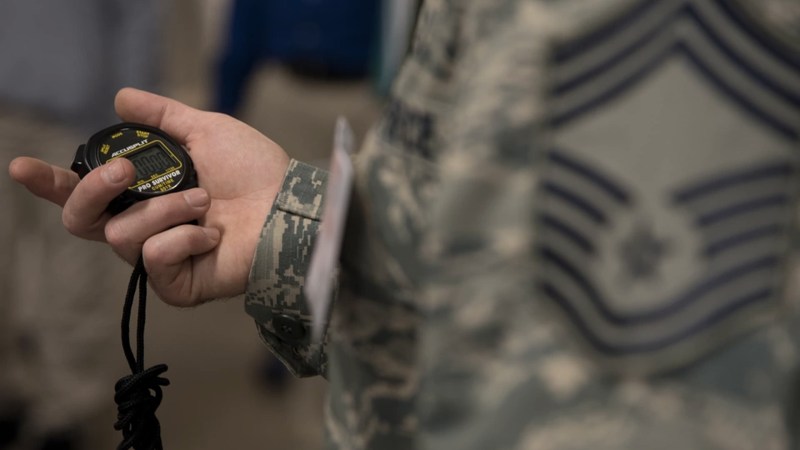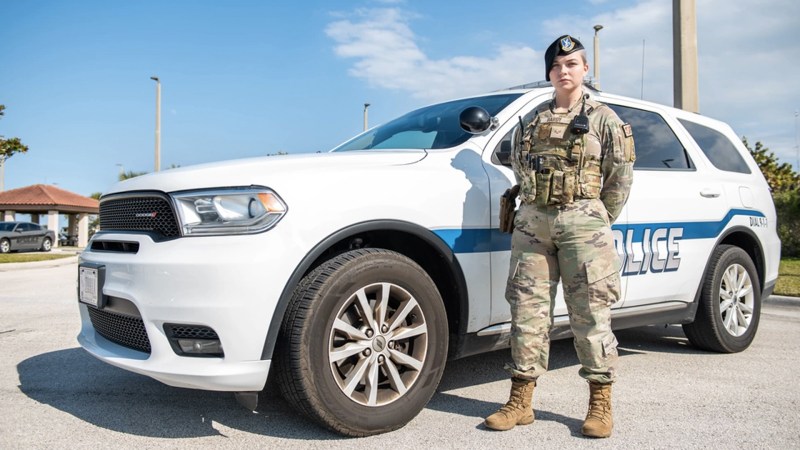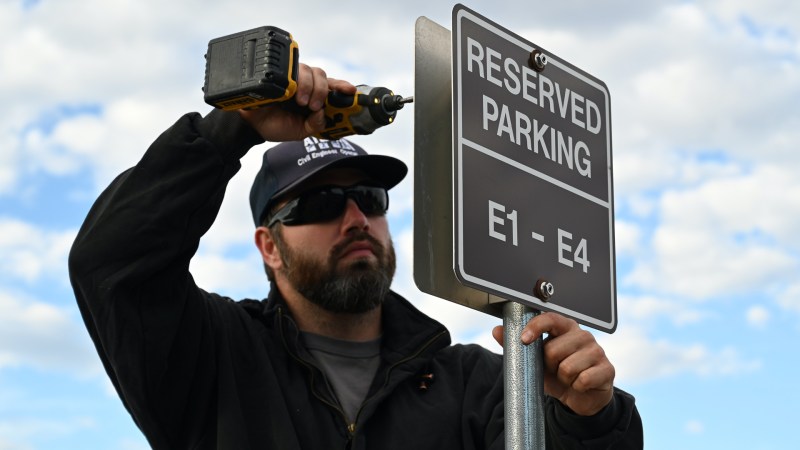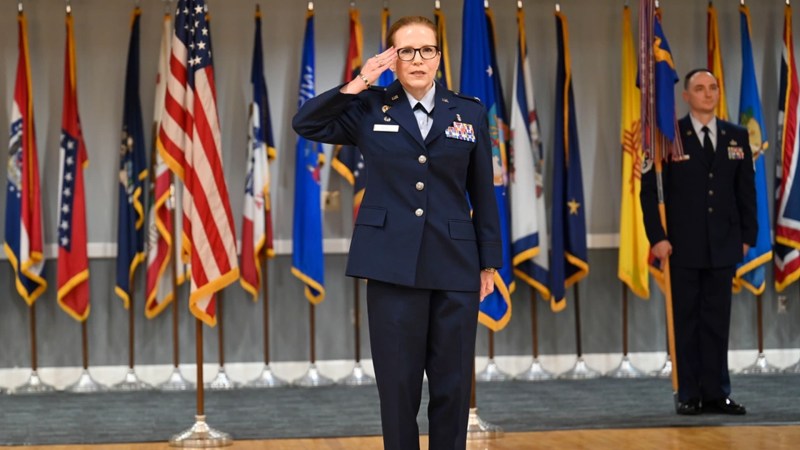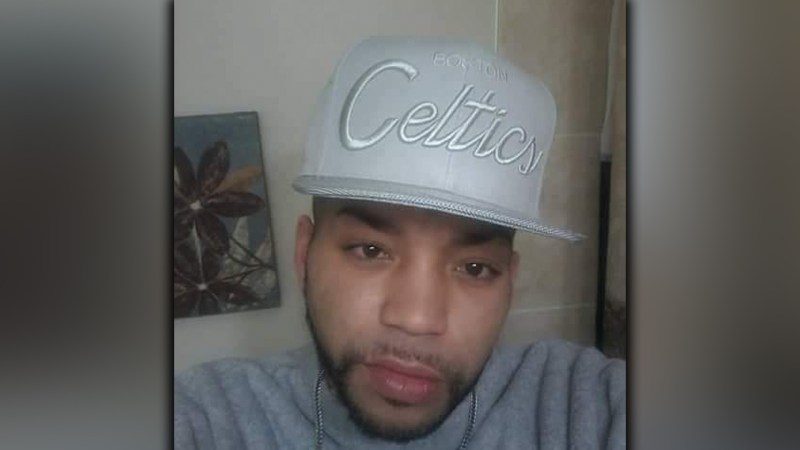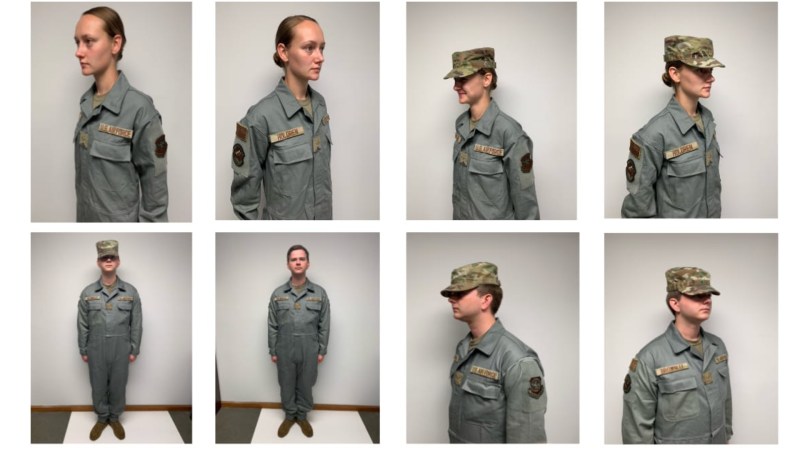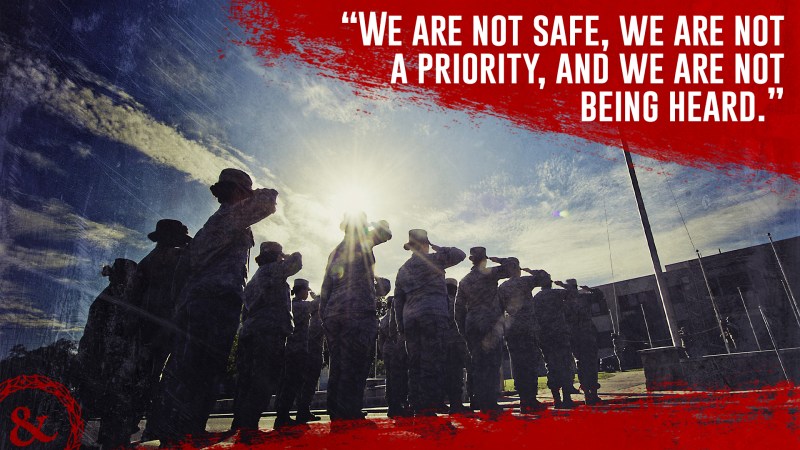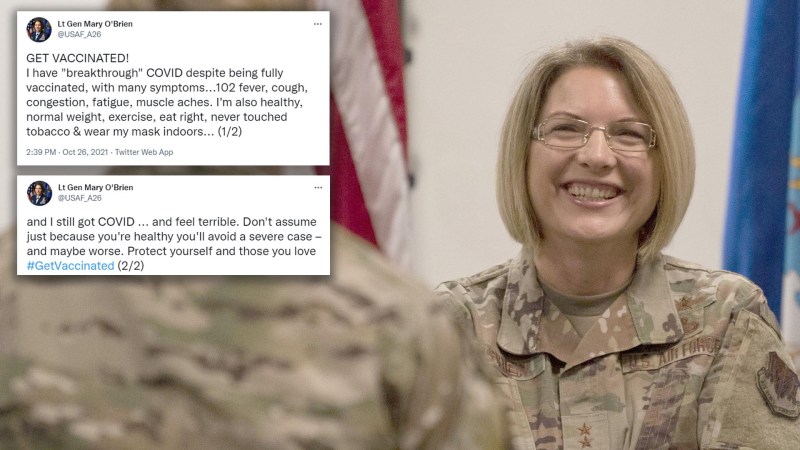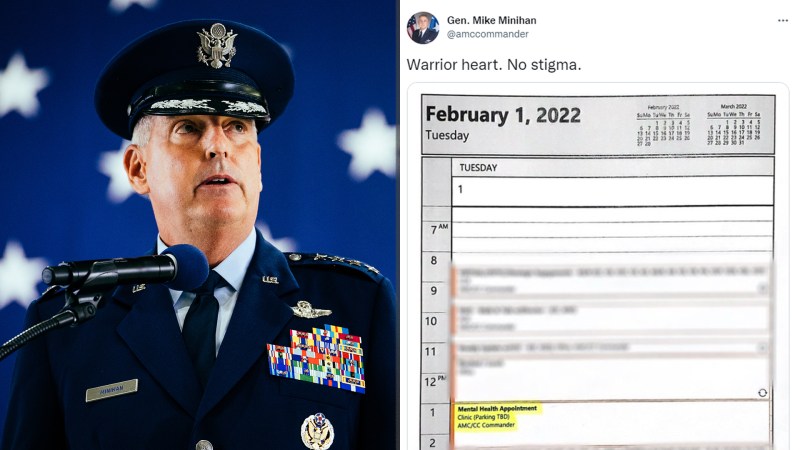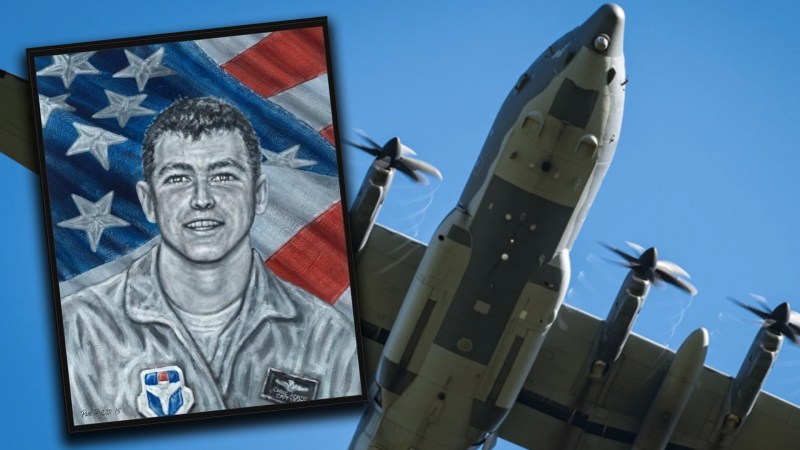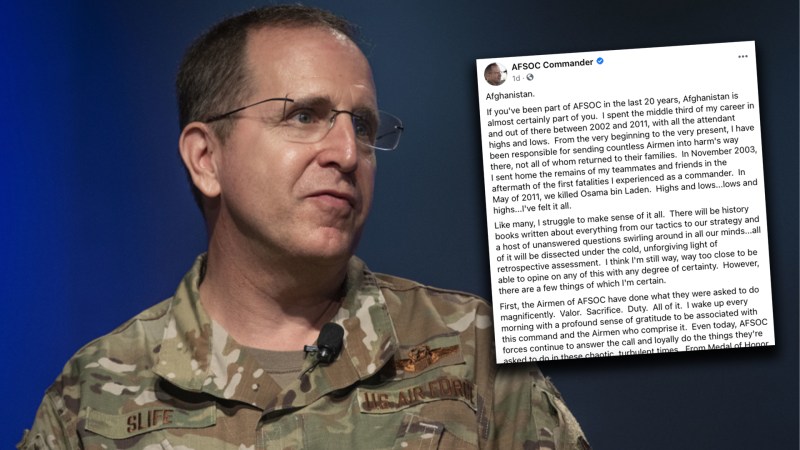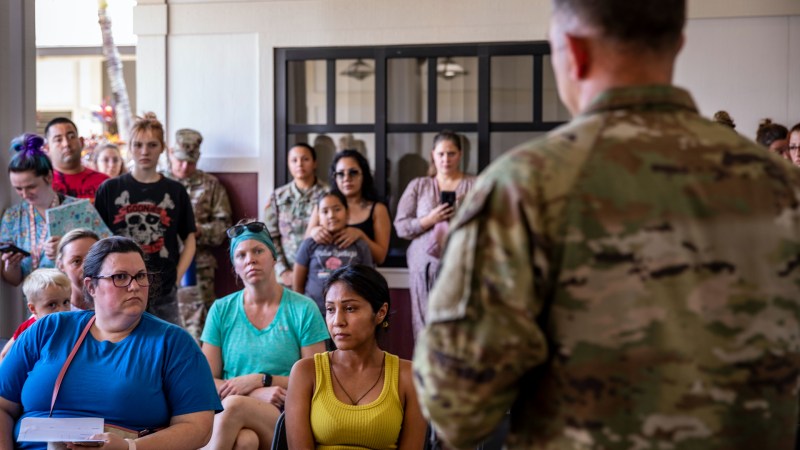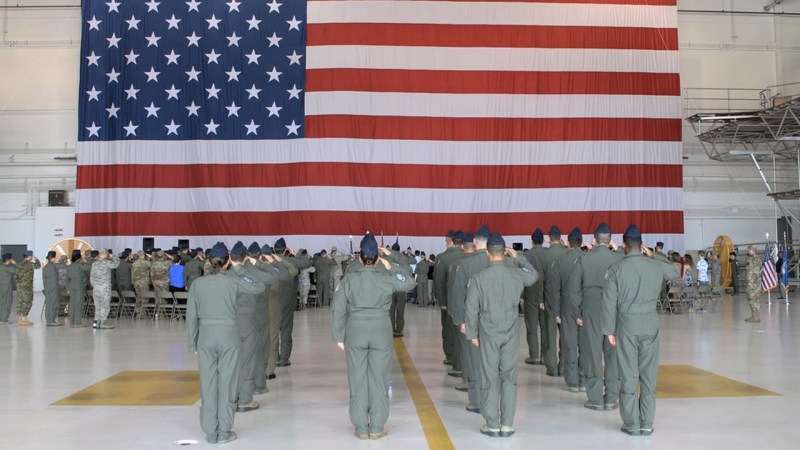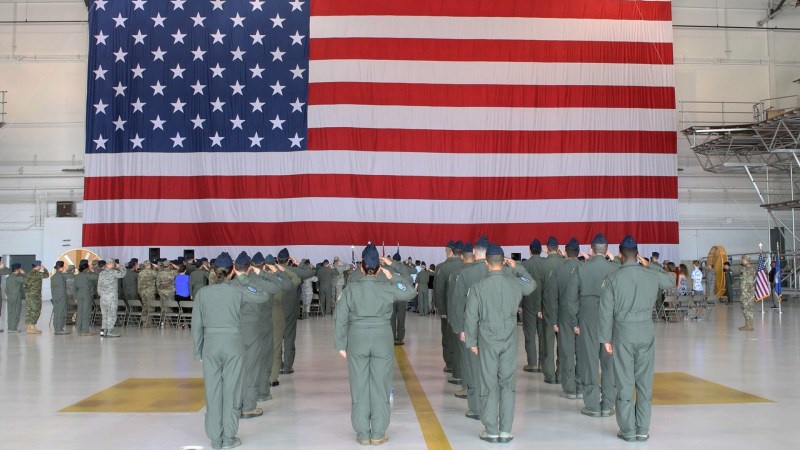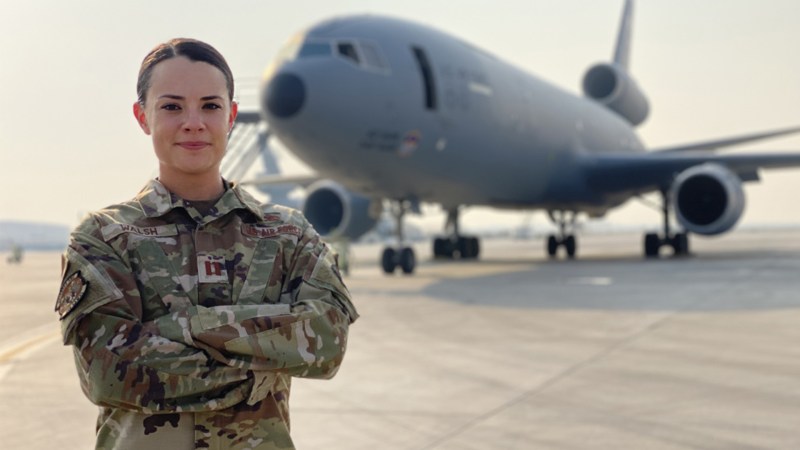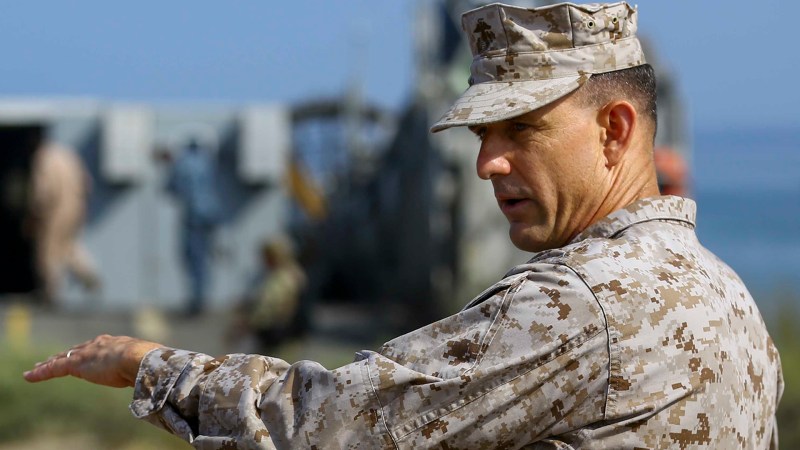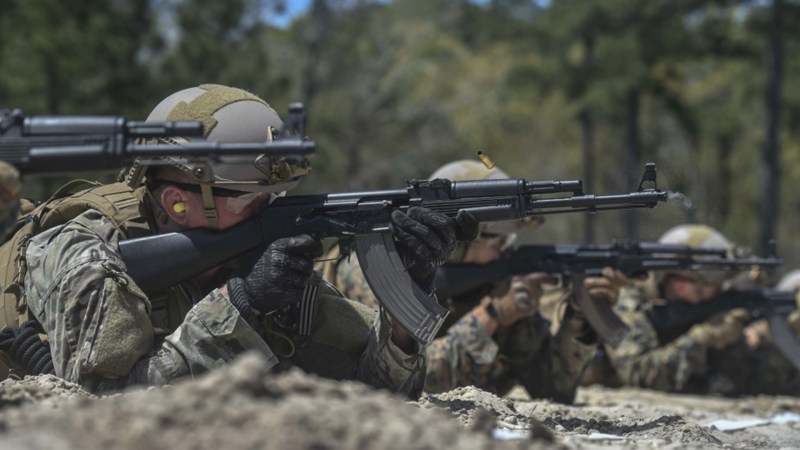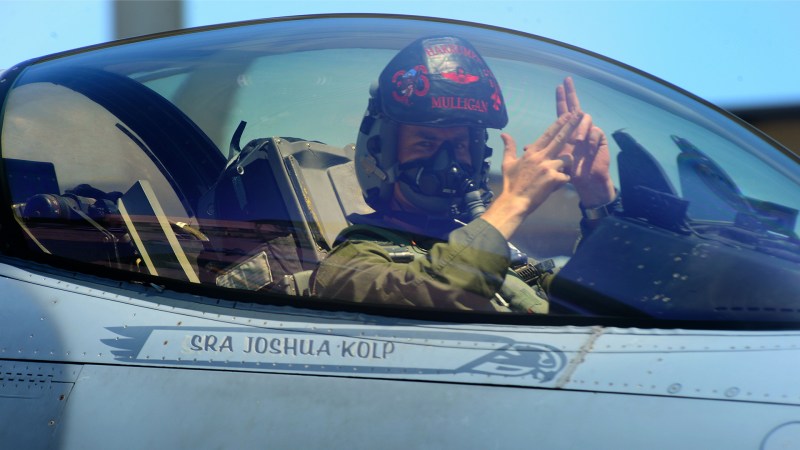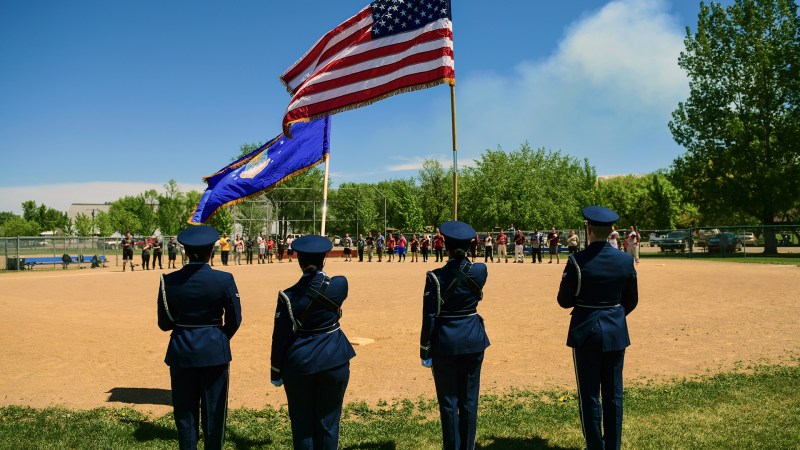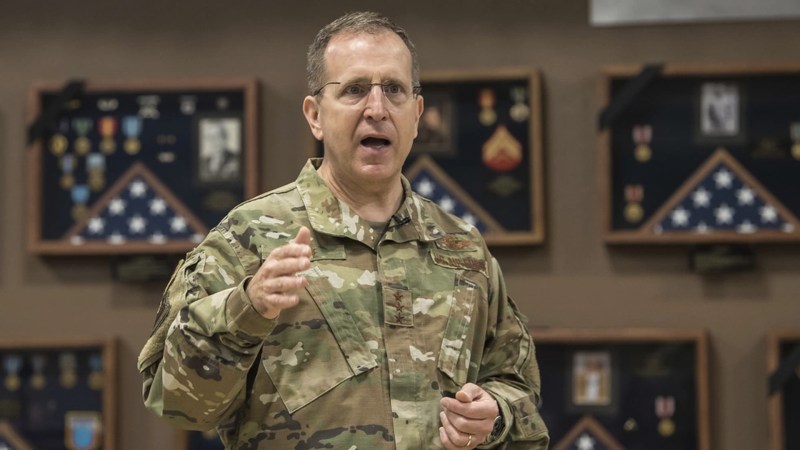Last May, an Air Force captain at Joint Base Lewis-McChord, Washington was convicted of disrespecting her superior officer, Col. Travis Woodworth — specifically for hanging up on him during a phone call.
The convicted airman, Capt. Heather Donovan of the 1st Air Support Operations Group, was reprimanded and docked $2,160 pay for two months, according to Air Force records. She was already voluntarily separating from the Air Force at the time of the offense.
Donovan faced three other charges at the court-martial. The airman was found not guilty of a 40-day period of alleged failure to go (which means not showing up at an appointed place of duty); willfully disobeying an order from a superior officer; and wrongful use of cocaine.
The first two charges were based on testimony that “was clearly not truthful as evidenced by the prosecution’s exhibits” and by evidence presented by Donovan, wrote her attorneys, Capt. Adam Zenger and Mike Berens, in a request to set aside the conviction of disrespecting a superior officer. The cocaine charge was called into question by evidence that staff at the Air Force Drug Testing Laboratory may have mishandled Donovan’s urinalysis sample.
The only charge for which Donovan was convicted was disrespecting a superior officer, specifically for hanging up the phone on Woodworth. Donovan’s attorneys sent their request to dismiss the conviction to Maj. Gen. Kenneth Bibb, who, as the commander of the Eighteenth Air Force at the time, was the convening authority over the court-martial. Bibb upheld the ruling.
Now a civilian, Donovan says that the federal conviction, combined with the costly process of a general court-martial, was a disproportionate response considering her otherwise spotless service record and the fact that she was already committed to leaving the Air Force at the time of the offense. Her lawyers made a similar argument in their request to Bibb.
“This Article 15, UCMJ, level military offense does not warrant the serious and significant consequences associated with a federal conviction. Namely, loss of the right to possess firearms and vote and the significant lifelong stigma associated with a federal conviction,” Zenger and Berens wrote in their request to set aside the conviction.
Retired Col. Don Christensen, a former chief prosecutor of the Air Force, held a similar opinion.
“Hanging up on somebody on the phone is not worthy of being in a court,” Christensen said. “It’s rather disappointing that the commander thought it would be appropriate to have a federal conviction for that.”
Bibb, who now serves as deputy inspector general for the Air Force, defended his decision to uphold the conviction.
“A jury panel ultimately convicted the accused of Article 89, disrespect toward a superior commissioned officer,” an Air Force spokesperson told Task & Purpose on Bibb’s behalf when asked about the case. “After considering the matters and consulting with the staff judge advocate, the convening authority chose to uphold the jury’s conviction in this case.”
Woodworth, the officer who Donovan hung up on, served as commander of the 1st Air Support Operations Group at the time of the offense. Woodworth was the named victim on two of the charges and, as the unit’s commanding officer, had the authority to prefer charges against Donovan.
Now retired, Woodworth declined to comment for this article through the public affairs office for the JBLM-based 62nd Airlift Wing. Maj. Michelle Matern, Donovan’s former supervisor at JBLM, also declined to comment. Lt. Col. Elijah Brown, the military judge who presided over the court-martial, also declined to comment. Lt. Col. Timothy Ward, a staff judge advocate with the 62nd Airlift Wing, said it was against Air Force policy for military judges to respond to media inquiries about cases they presided over.
Donovan said she felt that an Article 15, also known as a nonjudicial punishment, which does not require a court-martial, would have been a more appropriate penalty for hanging up on Woodworth, rather than pursuing the resource-intensive process of a court-martial. In November 2021, her lawyers asked Woodworth for an alternate disposition to try to resolve the matter without an expensive court-martial, but Woodworth declined on the advice of his counsel.
“They could have given me an Article 15 and I would have been out by Dec. 6, [2021],” Donovan told Task & Purpose. Instead, her separation was involuntarily extended to July 1, 2022.
‘Highly respected and admired’

After commissioning into the Air Force in May 2014, Donovan impressed many of her early supervisors and mentors, seven of whom wrote glowing character letters on her behalf.
“Capt. Donovan exceeded expectations and performed flawlessly … I found her to be one of the brightest and most eager young officers that I have had the pleasure of working with in my 30 year career,” said Col. Anthony Muir, one of Donovan’s superior officers at Tyndall Air Force Base, Florida, where Donovan worked as an intelligence officer from 2015 to 2018, in a character letter.
Among Donovan’s accomplishments were the 2017 Major General John S. Patton Outstanding Active Duty ISR Company Grade Officer of the Year award, an Air Force Achievement Medal for her work at Al Udeid Air Base, Qatar in 2018 in support of Operations Inherent Resolve and Freedom’s Sentinel, and an Air Force Commendation Medal for meritorious service from 2015 to 2019.
But Donovan’s promising career did not last as long as she had hoped. “I hate that Heather hit a rough patch in her career and decided to separate from the U.S. Air Force,” Muir wrote in his letter. “We are losing a superstar with a lot of upside.”
Subscribe to Task & Purpose Today. Get the latest military news, entertainment, and gear in your inbox daily.
During a difficult deployment to the Philippines in 2021, Donovan decided to separate from the Air Force. Donovan was struggling with mental health both during the deployment and after she returned to JBLM to begin the long, paperwork-heavy process of leaving the military. Basic tasks like doing dishes, laundry or even getting out of bed now felt overwhelming, like trying to pour from an empty cup, she said.
“I’m an intel officer. I have a Master’s Degree. I can read,” Donovan said in an inspector general investigation which was completed in February 2022. “But, I couldn’t for a month due to mental exhaustion.”
The inability to perform basic tasks is one of the many symptoms of depression, which is a common problem among Americans in general, including U.S. service members. Donovan herself was diagnosed with depression while still in the Philippines. Indeed, up to 9% of all appointments in the ambulatory military health network are related to depression, according to one study.
Donovan’s scheduled date of separation at the time was Dec. 6, 2021, but trouble was brewing for the airman. On Sept. 2, 2021, the captain’s supervisor, Maj. Matern, visited Donovan’s off-base home along with two master sergeants to conduct a wellness check. All three later reported smelling marijuana at the home, a claim which Donovan and her boyfriend, a former Green Beret named Jon Tuttell, disputed.
“I don’t smoke and I don’t know if it was coming from a neighbor’s house,” Tuttell said in the inspector general investigation. Recreational marijuana use is legal in Washington state. “I think they were being ridiculous. If you stand out in our neighborhood for five minutes, you’ll smell marijuana.”
When Matern and the two NCOs reported smelling marijuana and that Donovan seemed “out of it,” Woodworth consulted with a judge advocate and ordered Donovan to take a urinalysis test on Sept. 3, 2021, at the start of the Labor Day weekend. The decision alarmed Donovan.
“I don’t understand how we go from ‘I’m struggling after a deployment with these specific things (anxiety, depression, insomnia, having uniform items stuck overseas),’ to ordering a urinalysis,” she said. “I don’t know the train of thought that makes that appropriate.”
‘Can we talk?’

Things came to a head for Donovan on Sept. 7, the first work day after the holiday weekend.
On Woodworth’s behalf, another officer had ordered Donovan to report to work at JBLM at 9:00 a.m. on Sept. 7. Something may have been lost in translation, because Donovan said later that she had been told to report specifically to Col. Woodworth’s office. She did so, hoping for a chance to explain to Woodworth what she had been going through and to give him a letter explaining her mental state. But a surprised Woodworth turned her away.
“My understanding is she was told to report for duty at 0900 on 7 Sept, not to my office,” Woodworth said in the investigation. “She walked in my office and said ‘can we talk?’ I said ‘this is not the time and inappropriate at this point.’”
Woodworth told investigators he did not want to meet with Donovan in part because he “wanted to avoid the complainant potentially saying or giving him anything that would be incriminating or that would compromise the pending urinalysis,” the investigator said. He also prefers not to have “emotionally charged” conversations with anyone, the investigator said.
Donovan, who was under the impression that Woodworth expected her in his office that morning, was just as surprised by the colonel’s reaction. She had been hoping the conversation would be a chance to explain herself and to clarify why he had ordered the urinalysis. The airman recalled Woodworth simply saying “no,” to meeting with her, with no explanation.
“I was confused. I started tearing up not knowing what to do next,” she said in the inspector general investigation.
Donovan had prepared a letter attempting to communicate to Woodworth what she was going through, which she put on his desk.
“It is embarrassing, I’ve prided myself on performing under pressure in the past, dealing with stress and having healthy outlets and habits to cope,” she wrote in the letter. “Currently, I constantly feel like I am drowning, unable to keep my head above water.”
Donovan said the encounter alarmed her, and that she felt her leaders had put unrealistic expectations on her over the past few months considering both her mental health struggles and the fact that, as a separating intel officer not handling classified information, the captain was no longer performing primary or essential duties.
Donovan left the office, got in the car with Tuttell and drove to the base inspector general office to file a complaint against Woodworth, Matern and another superior officer. Meanwhile, Woodworth spoke with the judge advocate, who recommended he give Donovan a direct order to return to her duty location to work. He called Donovan to do so at around noon that day, right after the captain had left the inspector general’s office.
“He asked me, ‘I need an answer. Will you be here at 1300?’” Donovan recalled in the ensuing investigation. “No consideration at the time of the call that I was having a panic attack. It wasn’t a ‘I need you back at 1300 so we can talk, so we can adjust your hours to help you.’ It was … ‘I’m going to make you do this.’”
Woodworth recalled Donovan saying she was not coming in to work.
“I relayed ‘do you know who I am? Do you know this is a direct order?’” he said in the inspector general investigation. “She replied ‘I’m not coming in to work,’ and hung up the phone.”
Tuttell recalled Donovan was barely able to function when Woodworth called her.
“She was crying and very emotional,” he told investigators. “She wasn’t able to talk or breathe and fell to the ground and dropped her phone. I can confirm when he asked if she was coming to work, she answered in the negative saying she simply couldn’t.”

In her inspector general complaint, Donovan accused Woodworth, Matern and one other officer of failing to promote and safeguard the morale, physical wellbeing and general welfare of an officer in their charge, and she also accused Woodworth of maltreating an officer by ordering a urinalysis “to punish that officer for mental health issues,” she wrote, and by declining to meet with them afterwards.
The investigator did not substantiate any of the allegations, though he acknowledged the situation could have been handled better. Woodsworth’s refusal to meet with Donovan, his making comparisons to airmen who also had mental health struggles but still showed up to work, and his “making offhand comments like ‘there is no crying in my office,’ could lead a reasonable person to conclude that Col. Woodworth may not be receptive to or supportive of personnel with personal challenges, to include mental health issues,” the investigator wrote.
Meeting with Donovan after setting aside time for her to compose herself could also have served as an opportunity for Woodworth to better explain himself, the investigator said. Still, the investigator believed Woodworth was right to order a urinalysis and to order Donovan to return to work, which he did after mental health providers told him the captain was fit for duty.
“The word that came up when I spoke to mental health providers was ‘exaggerated,’” Woodworth recalled in the investigation. “That Capt. Donovan’s symptoms are somewhat exaggerated based on their testing.”
Another psychologist had a different opinion of Donovan’s mental health. A forensic and clinical psychologist, Dr. Shannon Wright-Johnson pointed out how the captain went virtually untreated for eight weeks after first being diagnosed with adjustment disorder with mixed anxiety and depressed mood on June 17, 2021, about a month before returning from the Philippines.
“Captain Donovan’s depression and anxiety symptoms are evident as she describes her mental state as ‘cracking under pressure’ and describes her daily life functioning as ‘overwhelmed easily,’ … with a ‘constant state of unease,’ the psychologist wrote in a May 2022 letter sent to Maj. Gen. Bibb in support of a clemency petition.
“There is no way to definitively assess or determine if she indeed had a panic attack as she reported during that 7 September 2021 telephone call, however, experiencing a panic attack is in line and consistent with her diagnoses,” Wright-Johnson wrote in the clemency letter.
‘That’s pretty bush-league.’

The urinalysis results were returned on Sept. 28, 2021, about four weeks after the sample was collected. It found a level of 249 nanograms per milliliter for cocaine, whereas the military cutoff is 100 nanograms per milliliter. At the court-martial, one forensic scientist said that a typical recreational dose of cocaine is 50 to 100 mg and, when ingested, might show a urine level of 5,000 to 10,000 ng/ml in an average person at peak concentration.
The amount detected by Donovan’s drug test is so slight that she may have ingested it accidentally from her surroundings without even noticing it, the scientist said.
“Unfortunately, cocaine is somewhat ubiquitous in our environment,” he said, citing one study which showed that more than 1,000 nanograms of cocaine are present on about half of U.S. dollar bills. Even so, in the Air Force, a positive drug test is a surefire way to get court-martialed, said Christensen, the former Air Force chief prosecutor.
“When I think about prosecuting somebody, the question is ‘why are you mad at this person, why prosecute this person?’” he said. “In this case it sounds to me like it’s because you think the person used cocaine. That in itself is a rational decision under the current way the Air Force prosecutes drug use. But tossing on ‘hanging up the phone’ is just piling on. It was a bad call, it makes no sense to do that.”
Donovan was found not guilty of her drug charge after the forensic scientist’s testimony and after the defense pointed out that multiple employees at the Air Force Drug Testing Lab who were involved in processing Donovan’s urinalysis sample had been decertified or suspended for misreporting and mishandling samples both before and after Donovan’s sample had been processed. Both the bottle and form for Donovan’s sample were also missing specimen numbers, which could have resulted in a technician accidentally testing a different sample.
Besides the drug charge, Donovan had also been charged with a 40-day period of alleged failure to go and disobeying a superior officer’s direct order, but her supervisors’ own words and the events of Sept 7, 2021 led to the captain being found not guilty.
That left the charge of disrespecting a superior officer, for which Donovan was found guilty, reprimanded and docked $2,160 pay for two months. Christensen questioned why the convening authority found it necessary to uphold the conviction.
“Is there really any reason she should have a federal conviction for hanging up the phone, especially when she is leaving the military?” he asked. “That’s pretty bush-league.”
Nearly a year after the court-martial, Donovan is still recovering from her last year in uniform.
“I did love the Air Force,” she said. “It was my home and family for a very long time, and the fact that it left this taste in my mouth is so sad.”
The latest on Task & Purpose
- A US Army M1 Abrams tank named ‘ASVAB Waiver’ is keeping watch over Europe
- The Baba Yaga returns: Keanu Reeves is back as John Wick, possible Marine vet
- A U-2 spy plane pilot took a selfie with the Chinese spy balloon
- How the Air Force flew its longest-distance night hostage rescue
- How Green Beret Paris Davis’ teammates fought the Pentagon for his Medal of Honor
Want to write for Task & Purpose? Click here.

